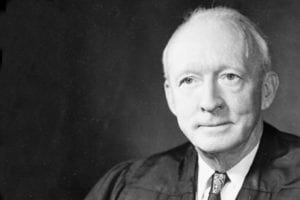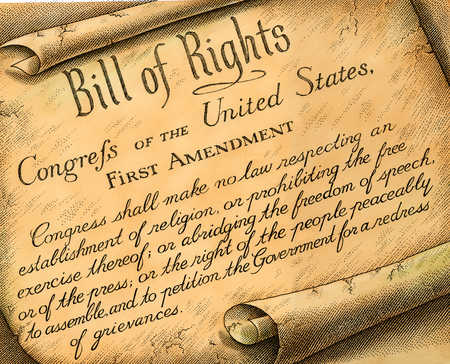
Bully Pulpit: Judge Roy Moore seeks bully pulpit in U.S. Senate – New American Journal graphic by Walter Simon
The Big Picture –
By Glynn Wilson –
MOBILE, Ala. — Judge Roy Moore is right about one thing.
“The world is watching,†he said the other night in church near here.
So now that we have your attention, world, there are a few things that need to be said.
Everybody in Alabama is not a dumbass, racist, redneck, neo-Nazi, Southern Baptist so-called Christian who supports Roy Moore in his bid to become a United States Senator.
In fact, unbeknownst to many, the great Senator and U.S. Supreme Court Justice Hugo Black was from Clay County, Alabama, just a little south of Etowah County, where Moore hails from — banned from the mall or not.
Black was also a Baptist and a Sunday school teacher.
But upon Black’s death on Sept. 25, 1971, the United Press International reported that he influenced American life more than any of his colleagues in modern times, including presidents. It also reported that “the Constitution was his bible.â€
Moore also likes to carry around a copy of the Constitution in his pocket, along with his King James Bible, and wave it around in church.
Unfortunately for him, his faithful followers and the rest of us, he never figured out what it means. Recall that his fellow students and law school professors said when asked about him back when he first ran for public office. They called him “Fruit Salad†and talked about his “incapacity for keen analysis.â€
While Black was known for his keen mind and mild manner, for being a champion for civil liberties, civil rights, freedom of the press and freedom of religion, Moore will say things like this, as reported by local television news.
“We do keep church and state separate from God. You see the doctrine we’ve been taught is that state is higher than the church.â€
What?
If I was still teaching as a college professor and Moore said that in class or wrote it on an essay exam, I would give him a big fat F.
Let’s review the material, shall we?
First I must point out that I was once involved in a so-called round table discussion with Moore in Montgomery at a Christian school, right after a federal judge ordered him to remove the granite monument to the 10 Commandments he snuck into the Supreme Court building in the middle of the night. I covered the trial for the New York Times and the Christian Science Monitor. At the outset of this meeting, Moore passed around a printed copy of the First Amendment, as if he was going to take the entire press corp to school on what it meant.
So I feel no compunction in showing it to my readers here today, so just there can be no mistake.
The First Amendment to the U.S. Constitution reads thus:
“Congress shall make no law respecting an establishment of religion, or prohibiting the free exercise thereof; or abridging the freedom of speech, or of the press; or the right of the people peaceably to assemble, and to petition the Government for a redress of grievances.â€
Clearly Roy Moore and his favorite President, Donald Trump, do not believe in the part about abridging the freedom of speech, or of the press, since Moore’s goons won’t let us take pictures at his public rallies, all in church. The president likes to call every news outlet in the land “fake news,†even though he was elected, in part, thanks to the fake news of his former political adviser Steve Bannon of Breitbart News.
But since the current confusion has to do with the separation of church and state, let us focus on that part.
“Congress shall make no law respecting an establishment of religion, or prohibiting the free exercise thereof…”
What does this actually mean? How has it been interpreted over the centuries by scholars and the courts? How do Roy Moore and the preachers who illegally endorse him for public office get this so wrong?
Here it is.
When the United States was founded and the American Revolution was fought to establish an independent nation apart from the empire of the British monarchy, many of the colonists who came to these shores had fled Europe specifically to escape religious persecution. When the Constitution was written a few years later, this was fresh on their minds.
Go back and study the history of Europe and recall that King Henry VIII had broken with the Catholic Church in Rome because the pope would not grant him a divorce from his first wife. Aided by the leaders of the Protestant Reformation, including Martin Luther, the king established the Church of England. Many Catholics were prosecuted and persecuted if they did not bow down to this new state religion. They were burned at the stake, had their heads cut off, and all their possessions were confiscated by the king’s government.
Perhaps Roy Moore and his followers never studied this history, or perhaps they have simply forgotten.
Establishment Clause
The point of the so-called “Establishment Clause†was to prevent anything like that from happening here. People of all faiths were guaranteed by the Constitution that they could worship however they “believed” was appropriate — as long as they did not try to impose their beliefs upon everybody else by official actions of the state. That means by the government.
So when Moore says on the campaign trail and on Twitter that he wants to “take god to Washington with (him),†to cheers from his faithful followers, what he is saying is that he will take THEIR god, the Southern Baptist interpretation of God, and impose it by god on the entire country by official government action from his pulpit in the United States Senate.
That’s exactly what he did on the Alabama Supreme Court. It’s why he was removed from office by the federal courts.
Let’s be crystal clear here. The First Amendment doesn’t just protect Moore’s Southern Baptist denomination’s interpretation of what religion ought to be. It protects all religious freedom, even for Methodists, Episcopalians, Catholics, Jews, Native Americans, Buddhists, Hindus, Muslims, even Mormons.
Moore claims to be against “liberal†judges making law from the courts, infringing on the rights of the legislative and executive branches of government. But when he was elected to the court, twice, he tried to impose his religion on all three branches of government.
“Judges who put themselves above the Constitution should be impeached,†he said the other night in Mobile County.
So when he was a judge, he tried to put himself and his religion above the Constitution, and he was removed from office because of that, twice. But he has still not gotten the point of the lesson. He just doesn’t get it and apparently never will.
“We’ve got to go back to the idea that god is a part of this culture,†he said. “Not just any god, but the god of the holy scriptures.â€
See? He wants to impose his god, “the god of the holy scriptures,†upon everybody else by government action. This should scare people all over the country, and not just be a punchline on a late night talk show.
God is already part of this culture. We don’t need Roy Moore to impose it on us any more. It is already on our money (and should be removed). It is on many public buildings. Many government bodies open their ceremonies with prayer. In many cases these are not ecumenical prayers. They are explicitly Christian prayers ending with “in Jesus’ name, Amen.”
Perhaps this is why people are confused. We ought to stop the practice. Is the Pledge of Allegiance to the Flag not enough?
Of course it is not clear at any point in time whether Moore is talking about the god of the New Testament (Jesus) or the god of the Old Testament (Jehovah). He quotes indiscriminately from the old testament and the new testament and clearly does not understand the difference between the two.
“The reason they don’t want me in Washington is that they don’t want to hear about god,†he said.
No, the reason people don’t want you in Washington is because you don’t know the difference between your “holy scriptures†and the Constitution. You have every right to believe in your god, but you can’t impose it on the rest of us. You can preach it to high heaven in any tent revival or church. But you can’t do it from the hallowed chamber of the United States Senate in Washington, D.C.
Separation of Church and State
Historians trace the phrase “separation between church and state” back to January 1, 1802, when it was mentioned in a letter by Thomas Jefferson written to the Danbury Baptist Association in Concord, Connecticut. The letter was published in a Massachusetts newspaper. The Baptists were early, fervent supporters of the doctrine of the separation of church and state because they were worried about being discriminated against by the Catholics and the Episcopalians.
Jefferson wrote, “I contemplate with sovereign reverence that act of the whole American people which declared that their legislature should ‘make no law respecting an establishment of religion, or prohibiting the free exercise thereof,’ thus building a wall of separation between Church & State.”
Jefferson was echoing the language of the founder of the first Baptist church in America, Roger Williams, who had written in 1644 about a “hedge or wall of separation between the garden of the church and the wilderness of the world.”
The Constitution, in Article Six, also specifies that “no religious Test shall ever be required as a Qualification to any Office or public Trust under the United States.”
Hugo Black on the Court
Jefferson’s metaphor of a “wall of separation” has been cited many times by the U.S. Supreme Court, including key important decisions written by Hugo Black.
In Reynolds v. United States (1879) the Court wrote that Jefferson’s comments “may be accepted almost as an authoritative declaration of the scope and effect of the [First] Amendment.”
In Everson v. Board of Education (1947), Justice Hugo Black wrote: “In the words of Thomas Jefferson, the clause against establishment of religion by law was intended to erect a wall of separation between church and state. That wall must be kept high and impregnable. We could not approve the slightest breach.â€
So in church, Black may have taught Sunday school and advocated for his Christian god. But in the Senate, and on the high court, he knew the difference between religion and secular government.
“I believe that our Constitution,” Justice Black once said, “with its absolute guarantee of individual rights, is the best hope for the aspirations of freedom which men share everywhere.”
If only Roy Moore could have gotten that lesson and figured out a way to pass it on to his people, he too might have one day been somebody. Instead, especially now that we know of his predilection for young girls and his antipathy toward women as well as other religions, he is doomed to be lumped in with other racist Nazis from Alabama, namely George Wallace.

U.S. Senate candidate Doug Jones rides with organized labor in the Veterans Day Parade in Mobile, Alabama, Friday Nov. 10, 2017: Photo by Glynn Wilson
If you take the right side of history, you might be derided by some of the people.
But if you take the wrong side, you are destined for the scrap heap of history.
A majority of the people of Alabama know what side Roy Moore belongs on.
His opponent, Doug Jones, is clearly on the right side of history.
Now if enough of those people who know which side is right will just show up at the polls to vote Dec. 12, our state may be saved further embarrassment on the late night talk shows and in the national press and media.
If you are still paying attention and yet don’t believe what I’m saying, because you think I am a “liberal†journalist, perhaps you might consider the words of another great man from Alabama, also a Baptist. I interviewed retired Auburn historian Wayne Flynt on these questions a few years back. Here’s what he said.
—
Editor’s Note: When I said in the beginning “the whole world is watching” I was not just talking about judge Roy Moore and Alabama. Since the New American Journal was credited with breaking the mall ban story by the New Yorker and every blog in the country, even “Late Night with Stephen Colbert” on CBS (video link), we are getting millions of hits from readers all over the world. So after many years of pioneering this new kind of watchdog journalism on the web, perhaps people are now ready to believe me and help build this platform.
If so, we just started a new GoFundMe fund drive to ramp up the resources we need to do this right. Please click on the link and make your contribution today. Help us counter the fake news of Breitbart News and stop Roy Moore from winning election to the U.S. Senate.

















Rather than strip churches of their tax exempt status for promoting political candidates and partisan causes, apparently the new GOP tax bill makes this kind of illogic legal. Sad day for all of America no matter what one believes-their church is slowing becoming “the state religion” to the expense of the rights of others.
Good points well put. I enjoyed your article as well as the informative, insightful commentary by Wayne Flynt.
I would just add that separation of church and state rests on more than the First Amendment. It is a fundamental American value that has long stood us in good stead and a bedrock principle of our Constitution. Just as the founders did not simply say in the Constitution that there should be separation of powers and checks and balances, but rather actually separated the powers of government among three branches and established checks and balances, they also did not merely say there should be separation of church and state, and rather actually separated them by (1) establishing a secular government on the power of “We the people” (not a deity), (2) according that government limited, enumerated powers, (3) saying nothing to connect that government to god(s) or religion, (4) saying nothing to give that government power over matters of god(s) or religion, and (5), indeed, saying nothing substantive about god(s) or religion at all except in a provision precluding any religious test for public office. Given the norms of the day (by which governments generally were grounded in some appeal to god(s)), the founders’ avoidance of any expression in the Constitution suggesting that the government is somehow based on any religious belief was quite a remarkable and plainly intentional choice. They later buttressed this separation of government and religion with the First Amendment, which affirmatively constrains the government from undertaking to establish religion or prohibit individuals from freely exercising their religions.
Unfortunately it is a value that has been eroded by political opportunists who muddy the waters with a certain constituency for personal and political gain. I fear we are losing the argument.
I enjoyed your article and think it is right on point. I am constantly explaining to Christians that should hope that their dream of a Christian theocracy never comes true because then America becomes a fundamentalist nation much like the Muslim nations are today. I know very few people who claim to be Christians that could actually live under the edicts of the laws of Christianity.
Just a point of fact here – Moore was removed from the State Supreme Court TWICE, but not by Federal Court action. It was by the Alabama Court of the Judiciary (COJ). IOW, even would-be colleagues in the State think he has continued to misunderstand & overstep the bounds of judicial responsibility.
The story never says otherwise.
In the one instance, I was talking about the 10 Commandments case.
Even in the second case it was still for defying a federal court ruling, on same-sex marriage.
More importantly, ask them whose version of Christianity will be acceptable? Evangelicals? Mormons? Catholics? Will Harvard be allowed to refuse to take in Evangelicals because they don’t admit to infant baptism? Will Calvinists be allowed to claim that social services should be denied because poverty is a sign of being out of God’s favor? Will Catholics be allowed to forbid in vitro fertilizations?
There is no belief too nutty that some one has not been able to find scriptural basis for.
“The president likes to call every news outlet in the land “fake news,” even though he was elected, in part, thanks to the fake news of his former political adviser Steve Bannon of Breitbart News.” news item, above
As long as I can remember, the GoP has been blaming everyone else for shit they themselves did first. It’s a tactic that is hard to defend against. But it’s been repeated so many times that people, thinking people, should be aware of it.